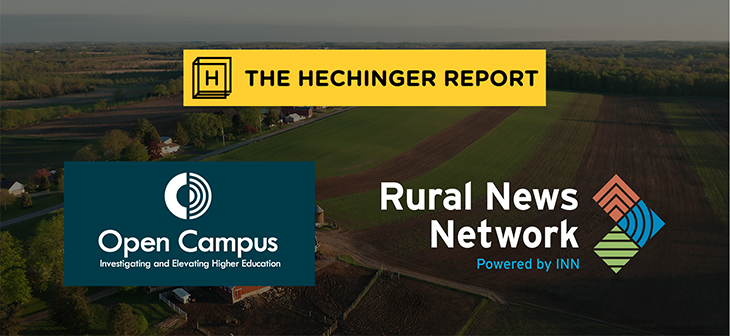
Strategic Media Partnerships Amplify Solutions to Rural Learners’ Challenges

Learners in many rural communities may benefit from being part of smaller, tight-knit communities, but rural areas generally lack the abundance of opportunities found in more metropolitan or population-dense areas. As such, rural communities often encounter gaps in resources and infrastructure, resulting in fewer postsecondary education and workforce training opportunities. Adequate funding, staffing, transportation, and Wi-Fi, for instance, are crucial as rural learners seek education beyond high school. And since each rural community comes with its own set of resources and challenges, ensuring adequate high-quality postsecondary education or training pathways requires anchoring solutions in local needs and contexts.
Increasing rural learner success may therefore begin with asking them and other rural stakeholders what resources their communities need. Media covering rural learners can be a vital part of this changemaking. On-the-ground reporters and storytellers have the capacity to listen to rural learners and uncover solutions to challenges that may also exist in other rural communities. Partnerships between media organizations can then amplify these solutions, inspiring leaders across the country while providing them with a richer, more informed understanding of rural education issues.
Three recent Ascendium grants support media organizations whose work amplifies the issues affecting rural learners from low-income backgrounds and makes a national impact by highlighting scalable solutions for success.
The Hechinger Report
One grant supports The Hechinger Report’s national reporting on innovative research, reforms, and solutions in postsecondary education and workforce training, including reporting on rural education, an increasing priority for their work. “While The Hechinger Report covers education nationwide, our reporting often begins at the local level,” said editor in chief Liz Willen.
Extensive interviews with rural parents, educators, and learners convinced Liz and her team of how uncovered rural areas are now, one reason why some Hechinger staffers have lived in the regions they report on. This local context helps their reporting capture the scope of problems alongside the unique strengths of these uncovered communities. As a result of their nuanced portrayals of rural education issues, Liz has noticed that rural readers are more likely to trust their reporting and apply solutions from another community to their own. For example, after Hechinger reporter Nichole Dobo wrote about how one rural college tackled their nursing shortage, higher education administrators from other states contacted that college to replicate their program. “Our national reach and audience help us spread promising solutions,” said Liz.
Subscribe to The Hechinger Report’s newsletters to never miss a story.
Open Campus
Another grant supports Open Campus’ coverage of rural postsecondary education and workforce training, like their bimonthly newsletter Mile Markers. Written by Nick Fouriezos, the newsletter spotlights rural learners and communities as it explores the role of postsecondary education in rural America. Nick sees the newsletter as a way to regularly connect with an audience of rural postsecondary education experts and learners interested in rural issues. Through his newsletter, he can gather this nationwide community to share ideas, resources, news, and funding opportunities.
The newsletter format also gives Nick more space to let rural voices speak directly to the reader in ultimately showcasing the specific needs and values of rural communities. “I am constantly trying to orient the story around the perspective of my sources, to truly dig deep and look at the issue through their eyes and not my own,” said Nick.
An example of this approach’s impact is the national attention to rural broadband access after Nick co-published an article with The Washington Post. Nick detailed the barriers that a rural county in Georgia encountered when applying for Biden administration grants to get reliable, high-speed internet access. Delays and gaps in coverage resulted in the widening of the education gap for these rural learners, who reported not having the technology to complete course assignments or attend school at all. In the article, Nick raised one innovative model for providing internet access to rural communities, along with recommendations and costs for implementing it on a larger scale.
Subscribe to Open Campus’ Mile Markers newsletter to stay connected with Nick Fouriezos’ reporting.
Rural News Network
An additional grant supports the Institute for Nonprofit News’ Rural News Network (RNN), which is a collaboration producing locally sourced reporting across rural America. Like The Hechinger Report and Open Campus, RNN is committed to creating systemic change in rural America through local reporting that lifts rural voices. RNN does this by expanding the reach of rural news outlets as they identify community needs and pathways to sustainable solutions.
“Many smaller newsrooms lack the capacity or resources to invest in the kind of in-depth reporting that can catalyze this process,” said Alana Rocha, RNN Editor at the Institute for Nonprofit News (INN). “The power of INN’s Rural News Network is in its scope. Seventy-six newsrooms based in or consistently covering forty-seven states means that, when they link up via an RNN collaboration to cover a single issue, key stakeholders take notice of the nuanced reporting that results.”
Subscribe to the Rural News Network’s weekly newsletter to read news from around rural America.
Ascendium is committed to strengthening media outlets’ capacity to produce nuanced reporting and storytelling on rural postsecondary education and workforce training. Through these and other solutions-focused media partnerships, Ascendium aims to amplify local solutions that can make a national impact for learners from low-income backgrounds.

